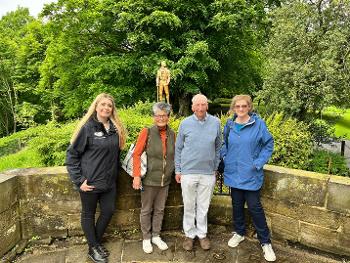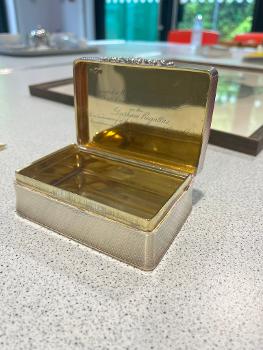It's a family affair at historic Durham City park
A man whose ancestors created and gifted a city one of its most popular parks has spoken of his delight at visiting it for the very first time.

From left, Wharton Park programme officer Louise Vest, Teresa Wharton, Richard Wharton and Jill Hollingworth, Chair of the Friends of Wharton Park, in front of the statue of Richard's ancestor, William Lloyd Wharton.
We now own and maintain the park, but it was originally created by William Lloyd Wharton in 1857. William was an influential figure in County Durham, serving as High Sheriff and as a director of North Eastern Railway. He was also a trained lawyer, a keen astronomer and helped to launch the annual Durham Regatta event, which took place for the 191st time last weekend.
On William's death, Wharton Park passed to his nephew John Lloyd Wharton, and later his daughter, Mary Dorothea Darwin, known as Marnie, who gifted the park to the City of Durham after her father passed away in 1912.
For Richard Wharton, a retired doctor from Bath, news that there is a park bearing his name in the North East of England came as a wonderful surprise. Richard's great, great grandfather was William's elder brother, and Richard is one of his closest living relatives bearing the Wharton surname.
Discovering his past
When he was growing up, Richard's father never spoke about his past, and it was not until he started to research his ancestry a few years ago that he discovered the extent of the Wharton family's legacy in County Durham.

The silver trinket box presented to William Lloyd Wharton at Durham Regatta in 1836.
Richard's research soon led him to discover his family's links to Wharton Park and Durham Railway Station, which was also built on land owned by William Lloyd Wharton.
The grandfather-of-five decided he had to see if for himself and contacted us and the Friends of Wharton Park to arrange a visit.
Louise Vest, Wharton Park programme officer and Jill Hollingworth, Chair of the Friends of Wharton Park, were only too happy to show Richard and his wife, Teresa, around. This included taking the couple to see the statue of William Lloyd Wharton by sculptor Tommy Craggs.
To find out more about Wharton Park and the Friends of Wharton Park, visit Wharton Park
Wonderful surprise
Richard said: "I think the park is fantastic and it makes me feel emotional to think that this was all started by my ancestor. Being from an established family like this, you can often feel that they were too privileged and so it means a lot to me that William Lloyd Wharton wanted to give something back to the community.
"As a young man, I wanted to make my own way in the world, and I wasn't interested in the past. I had three children and worked long hours. It was only when I inherited all the family documents that I started to take an interest and began transcribing the letters. It was a wonderful surprise to learn about Wharton Park and it has been a great experience to visit."
A peaceful place
Louise said: "We are all very proud of Wharton Park and were incredibly excited when Richard got in touch. It's been a pleasure to show him around the park and to highlight the restoration work that has been undertaken, along with the many ways we celebrate its history.
"The Wharton family wanted the people of Durham to have a peaceful place to escape from the hustle and bustle of the city, and - almost 200 years later - it remains just that."
Richard also visited the team at Durham University's Palace Green Library, which looks after the Wharton family archive, during his trip to County Durham.

 Share this page on Facebook
Share this page on Facebook
 Share this page on Twitter
Share this page on Twitter
 Print this page
Print this page





